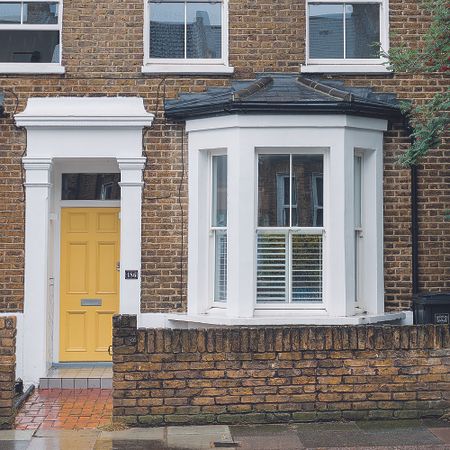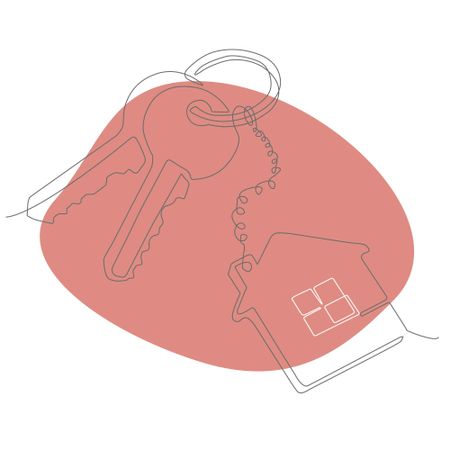How to sell your house: a pain-free guide to putting your house on the market
Find out the best process to follow to keep your house sale as stress-free as possible

Understanding how to sell your house is key for anyone looking to put their property on the market. Selling your house can be daunting and exciting in equal measure, and the process is not without its stressful moments so it pays to be prepared for what’s to come.
Whether you are considering a local estate agent to sell your house, or going down the route of an online agent or auction house, following this handy guide will give you the best shot at a smooth sale.
If you’re buying a house as well as selling, make sure you check out our guide to the best mortgage rates.
1. Check mortgage restrictions

Before you rush to erect a ‘for sale’ sign out front, check the details of your current mortgage.
If you’re mid-way through a mortgage term, there could be a big penalty for breaking the contract early. It’s known as an early repayment charge and it could add thousands of pounds to the cost of moving house.
Some mortgages are portable, which means you can shift the same deal to a new property. It won’t always be suitable or possible, so speak to your lender about options for porting your mortgage.
Consider speaking to an independent mortgage broker if you’re looking to buy once your property is sold.
Leaseholders should check how long is left to run on a lease. You may need to buy an extension if it’s nearing 80 years. Otherwise, banks are reluctant to lend to buyers.
2. Get a valuation
You can’t sell anything until you give it a price tag. Homes are no exception. Invite three estate agents to make a house valuation so you can compare.
Search property selling websites like Rightmove and Zoopla for prices of properties similar to yours, in the same area. You can also search for sold prices in your area.

Use HM Land Registry for sold prices in postcodes in England and Wales. There is also Scotland’s Land and Information Service, and Northern Ireland’s Land and Property Services if you are outside of England and Wales.
Supply and demand in your area will ultimately dictate the offers you get.
3. Prepare for photos and viewings
Hiding clutter and whizzing around with a vacuum is a decent start. However, if you have serious clutter issues consider storing items in a garage, or off premises if you don’t have the space.
And consider paying to fix flaws you can’t mend yourself. Increasing the appeal of your home leads to offers.
Toto Lambert, partner at the Chelsea office of Knight Frank estate agents, says: ‘There’s no guarantee that a brand new, expensive bathroom or kitchen is going to hugely change the value of your home.
‘Work with what you’ve got and focus on creating a great first impression.’
Increasing the appeal of your home leads to offers. Viewers will want to see the whole property, so even lofts and garages should look presentable.
But don’t strip the house bare. Buyers will have a better idea of how space is used when there’s furniture in it.
Lambert adds: ‘Easy wins include a thorough deep clean and declutter, fresh flowers or house plants, and a candle or diffuser to create a minimalist but lived-in ambiance.’
4. Pick an estate agent
Ask for recommendations and inspect contract details. Make sure you find out:
- how much is their commission?
- does it include VAT?
- what are their marketing methods?
- do they insist on sole selling rights?
The latter means you pay the agent commission, even if you find a buyer yourself.
Check how soon you can ditch an estate agent if you’re unhappy with their service, or if they fail to sell your home in a reasonable period.
Don’t be afraid to negotiate. You can always ask if they will lower their commission if they fail to sell within a set time.
Fees are typically between 1 and 3 per cent of the sale price. The average is around 1.42 per cent, including VAT, according to website The Advisory. It’s possible to instruct more than one estate agent, but it costs more.

Jonathan Rolande, founder of House Buy Fast, says: ‘Estate agents are working hard for their fee so negotiate. They’ll start at 1.5 per cent, aim for around 0.75 per cent. It could save you thousands of pounds.’
Consider online estate agents too - they can potentially save you thousands of pounds. Examples include Purplebricks, Strike, Yopa and Emoov. Prices for online estate agents range from £75 to £1,500.
They don’t have high street branches, but can offer much of the same services remotely.
Packages vary, but it’s wise to choose one that lists your home on Rightmove and Zoopla.
You might have to conduct viewings yourself. If this doesn’t appeal, or it isn’t practical, choose an agent that can include viewings.
Finally, check if an estate agent is a member of a professional trade body, like the National Association of Estate Agents or Royal Institute of Chartered Surveyors.
It should also be a member of a dispute resolution scheme like The Property Ombudsman. This means if you have a complaint down the line, it can be reviewed independently.
Do I have to use an estate agent?
No. Most people do, and for good reason. There’s less hassle for you. However, you can sell your house privately, or via auction. There are also companies that pledge to buy your house quickly, regardless of condition. However, you risk getting below market value. There may also be scammers operating in this field, so do exercise caution.
5. Get your paperwork in order
An Energy Performance Certificate (EPC). This shows how much energy a property uses and how much that energy typically costs. It gives an efficiency rating from A down to G, and lasts for 10 years. You may still have a valid EPC. Find out by checking the register. If not, it costs anywhere between £35 and £120.

Your estate agent may be able to provide an EPC. If not, you will need to find an energy assessor.
Make sure you have paperwork in order too – such as bank statements, proof of ID, mortgage information, and title deeds for the property.
‘It’s important to be able to transact quickly and efficiently,’ says Andrew Perratt, head of country residential at estate agent Savills.
‘Gather together guarantees and permissions, and be clear on what you’re prepared to leave behind or plan to take with you when you move.’
6. Negotiate a sale
Hopefully you will start to get serious interest from buyers. So be prepared to negotiate. Always have in mind the minimum you are prepared to accept.
A sale only becomes legally binding in England, Wales, and Northern Ireland once contracts are exchanged. The rules are slightly different in Scotland.
Estate agents are legally obliged to inform you of all offers made. Ask the estate agent for details about buyers – such as whether they have a mortgage in principle. It shows a lender is likely to give the buyer a mortgage, but it’s no guarantee.
There might be a cash-buyer ready to move quickly, or a buyer that comes with a long chain – someone buying their home, who is also selling another, and so on. The longer the chain, the more likely something can go wrong with one purchase that affects everyone else. These details might influence which offer you accept.
Think about whether you want to try to sell certain fixtures and fittings, or include them in the buying price as a gesture.
Prepare for a home survey to be carried out by the buyer. If it throws up any snags, a buyer might use it to renegotiate the price. Discuss flaws you know about honestly so they’re already built into early stage offers.
7. Appoint a solicitor or conveyancer
A conveyancer manages the legal transfer of ownership from seller to buyer. It can be a solicitor, or a licensed conveyancer. Fees range from several hundred pounds up to £1,500.
Conveyancers will liaise with estate agents and a buyer’s legal representatives, so that all parties fix on a date for completion. Expect questions to come from the buyer’s legal team about your property. Answering queries promptly helps to keep the process moving. The same goes for completing and returning signed paperwork.
Once contracts are exchanged the sale is legally binding for both parties. There are penalties for breaking them.
8. The completion date

Following the exchange of contracts, you work towards a completion date. This is when you move yourself and your belongings out of the property, clean up, and hand over keys. Money is also transferred from buyer to seller, via respective legal teams.
Get quotes for removal firms that can help you shift furniture and belongings. A removal firm should be insured. You can search for one on the website of the British Association of Removers.
You can also compare offers on websites like reallymoving.com.
And finally . . . The power of goodwill
Always keep the big picture in mind. Try not to fixate on every pound gained or lost. Act honestly, and fairly, and hope that a buyer reflects integrity back at you.
Get the Ideal Home Newsletter
Sign up to our newsletter for style and decor inspiration, house makeovers, project advice and more.

Laura Shannon is an award-winning consumer and money journalist with more than a decade of experience in her field. She has written for a number of titles including Metro, The Times, Daily Mail, and held the post of personal finance correspondent at The Mail on Sunday for eight years. She is passionate about helping people to save, understand, and manage money more effectively.
-
 6 things that feel illegal to declutter — and how professional organisers reuse them around the home instead
6 things that feel illegal to declutter — and how professional organisers reuse them around the home insteadExperts reveal what to do with those 'just in case' items
By Lauren Bradbury
-
 The 5 best plants for a Japanese garden – key trees and flowers to help nail the style
The 5 best plants for a Japanese garden – key trees and flowers to help nail the styleWe checked in with garden experts to curate a checklist
By Sophie King
-
 The Grecian bookshelf trend adds a luxury look to your reading corner, and it’s super easy to get the look at home
The Grecian bookshelf trend adds a luxury look to your reading corner, and it’s super easy to get the look at homeIt couldn't be easier to get the look, too
By Kezia Reynolds
-
 You can claim back over £300 a year from HMRC if you work from home - here’s how to check if you’re eligible
You can claim back over £300 a year from HMRC if you work from home - here’s how to check if you’re eligibleWhen it comes to saving, every little helps
By Kezia Reynolds
-
 Experts have revealed the best day to renew your home insurance policy - you’ll want to do it sooner rather than later
Experts have revealed the best day to renew your home insurance policy - you’ll want to do it sooner rather than laterDon't leave this task at the bottom of your to do list
By Kezia Reynolds
-
 Is a variable rate mortgage ever a good idea? Experts weigh in
Is a variable rate mortgage ever a good idea? Experts weigh inOur money expert explains what a variable rate mortgage is, who they can be good for, and the pros and cons of this kind of mortgage
By Samantha Partington
-
 I’m a first-time buyer, what are my chances of getting a mortgage right now?
I’m a first-time buyer, what are my chances of getting a mortgage right now?And what you can do to increase your odds
By Rachel Wait
-
 Should you ever pay above the asking price for a home?
Should you ever pay above the asking price for a home?Our money expert explains whether you should ever pay over the asking price for a home, especially if house prices fall as predicted
By Samantha Partington
-
 Should I fix my mortgage and how long should I fix for?
Should I fix my mortgage and how long should I fix for?We speak to the experts to find out whether you should fix your mortgage and how long for as well as the impact further interest changes could have on your decision
By Samantha Partington
-
 We put your mortgage questions to two leading experts, here's what they said
We put your mortgage questions to two leading experts, here's what they saidAs mortgage panic continues, we've answered the most common questions - from when mortgage rates will come down, to when you actually have to pay stamp duty
By Samantha Partington
-
 'My mortgage is set to skyrocket - what should I do?' 5 potential solutions from a money expert
'My mortgage is set to skyrocket - what should I do?' 5 potential solutions from a money expertIf you're facing higher mortgage costs, our money expert explains various courses of action you could take to ease the pressure
By Samantha Partington